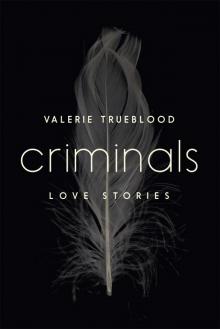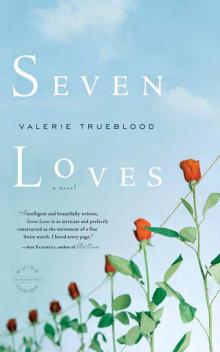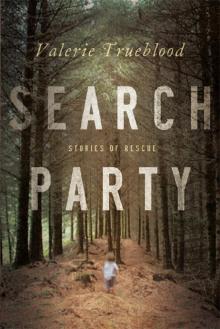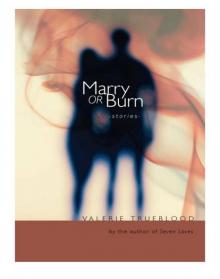- Home
- Valerie Trueblood
Seven Loves Page 10
Seven Loves Read online
Page 10
“Come see the baby?” May coaxed him. But he didn’t really acknowledge Laura’s baby. He had been her baby. If Laura missed a week, he asked when she was coming, but then when she did come he hid in his room.
“You don’t have to, Nicky,” Laura reassured him. “This little guy will be following his uncle Nick around soon enough. Bring that sheet over and I’ll tear too. I hear you picked the cat’s name.”
Keyhole, Nick had named the cat, for the habit it had of rising delicately on its hind legs at the doors and stretching up as far as it could to sniff at the doorknobs. “It’s the keyhole, not the doorknob!” Nick said. “I figured it out! It’s trying to see through the keyhole.”
“I think we should have named it Felix. Felix the cat,” Vera said. All Vera and Cliff read were comics, movie reviews, and books about yoga. Next year Vera would be really gone, there would be only Nick. As a senior she had no work to do and she spent all her time with Cliff, who was already at the university. Cliff was a tall boy with a glossy black braid that reached his belt. Not the smartest of Vera’s string of boyfriends. Whenever he was at the house he cornered May in the kitchen and poured out his fear of flunking out and being drafted. But most of the time he lived at the movies with Vera. Vera was going to study film; she was going make movies, she said, that were visually beautiful but political. May had found Cliff rather sweetly and foolishly underfoot until one day she saw him from the upstairs window polishing his Trans Am in their driveway with his shirt off. Why, Vera’s sleeping with Cliff, she thought. Of course. It isn’t the draft, it isn’t yoga, it isn’t film. It’s the black hair, the white skin.
“Felix means cat,” Vera said.
“No, it doesn’t,” Laura said, laying the baby on his back and holding his clenched feet, letting his head hang off her knees at an angle May would never have allowed a baby. His top lip with the nursing blister on it dropped up to show his sharp little pink gum, and he fell asleep with the ease of a cat. “Feline comes from a different root. Felix is happy. Cat and happy don’t have the same root.”
“So what?” Vera said.
“Is that right? They should, shouldn’t they?” May said. “I can’t remember my Latin. Surely they’re related.”
“Anyway, Felix is masculine,” Laura said.
“I hated Latin.” Vera peered at the sleeping baby. “This is just what you looked like, Nick. Pale and wormlike.”
“I did not!”
“I didn’t mean it, this darling child is not wormlike,” Vera said, squatting down and putting her arms around her sister’s legs with the baby on them. “Maybe I’ll get pregnant someday.”
“He’s not pale, either,” Laura said calmly.
The first time they ever turned on the porch light and saw two cops with Nick between them, it was because of the cat.
The cat was not young when it came to them, and the second year it got noticeably older. It slept all day motionless on Nick’s bed and in the evenings prowled restlessly with its tail switching, pausing on the hall rug and going on to breathe the dust of each air register, where it would rub against the grille for minutes at a time, drunk on some promise of the heating ducts. It tested the screwed-in metal plates delicately with a claw. “Keyhole wants to go in there,” Nick said.
Gradually, though, the cat had stopped coming for its food, and the smelly stuff spooned out by Nick congealed in the dish. “Today it didn’t eat again,” May told Cole when he came home. “Tomorrow I’m taking it to the vet.” But the next day was the day the cat disappeared.
“Cats leave a house for two reasons,” Cole said at the dinner table. It was the night after the disappearance. “Convenience or death. As far as I know we didn’t inconvenience the cat, so that leaves death. Probably it just went somewhere away from people and houses and crawled into the underbrush. That’s what they like to do.”
“How do you know?” Nick said loudly. He had begun to wheeze. May sent Cole a warning look but Nick was out of his chair. He was ten, getting some growth, and when he hit Cole it was not in fun.
“I know cats. Hey, fella, hold it! Hey, no, it wasn’t you. You didn’t inconvenience Keyhole. You took great care of him.” Cole pulled Nick to him by the fists. “Slow down, buddy. Where’s his inhaler? Can’t anybody keep track of it? May? It’s all right, Nicky. Slow down. It’s a bad feeling, I know. Just breathe—that’s right. Slowly. That’s right. We’ll all go out tomorrow and look for the cat. That’s right. Slow . . . in . . . slow . . . out.”
They were asleep when the doorbell rang. Cole’s feet hit the floor while the ring was hanging in the air.
“I turned on the light and there they were—two cops and Nick!” They were back in bed. “Jesus!” May held his icy hands. “I didn’t even know he wasn’t in the house!” Cole was trembling. “What is it with him? What is it?” He did not tell her until morning that Nick had been a mile away in a thickly wooded part of the arboretum, where the police had found him when they went in looking for junkies sleeping in the open in the warm weather.
May had reached the bottom of the stairs in her robe as Cole was closing the door on the police. Nick was standing on the hall rug, hands black, face streaked with tears and dirt. “Hi, Nicky,” Vera said softly from the stairs. The police cruiser started up outside, a red beam and then a blue one probing the stairs. For a minute all four of them stood there stupidly. May half expected the cat to come into the hall with its alert, approving look.
“It’s three AM,” Cole said. He too was speaking softly, not at all angrily.
“I didn’t find Keyhole,” Nick said. May took his hand and he stumbled up the steps. At his door they all hugged him, and they all went to bed.
Although there were many occasions ahead of them when Cole would be angry, very angry indeed, that night it was as though he had been led downstairs in a dream to speak to Nick, touched on the shoulder by the quiet genie of what is to come. It was a dulling, anesthetic touch, holding Cole under the hall light while the carpet unrolled before his sleeping eyes, with all the unreadable figures in it, of a time when all would be known and enacted in full, when even his own fury at what came into the house with this son and tore them from their beds would be woven in and smoothed away.
“I’ve had the most amazing experience,” May said. “I’ve seen the cat.” She said it to Vera and Cole, who had been planning to meet them at the campsite the next day but had arrived before she even sat up in bed and saw where the ambulance had taken her.
“OK, Mom,” Vera said. They were crowded around her bed in the little hospital. “OK, if the cat was ten when it left, and there’s no way it was that young, it would be pretty much seventeen now. Right? It couldn’t be Keyhole, Mom. And how would it have gotten over here?”
“Well, with anybody who had it. You see people on the ferry with cats in the car. Remember how it came to us? Maybe it went back to its real owner.” But of course they knew it hadn’t. Laura had traced the cat.
Seven years ago, for Nick’s sake, Laura had walked the neighborhood for hours with the baby on her back, looking for the cat, and quite by accident she had found the couple who had lost it. This became one of their family stories. The cat had run away from a house not far from theirs, in the same neighborhood but outside the perimeter of news that might pass on the sidewalk. Laura had struck up a conversation with a woman who was gardening, who had noticed her a time or two, walking with the baby asleep in his pack.
“What a peaceful baby,” the woman said, getting to her feet with her trowel. “A boy, isn’t it? He must be about, what, fifteen months?”
“I told her I was looking for a cat. Well, neither of us could believe it—it’s their cat. She described it exactly. They’re the couple in the stucco house where we used to go over the wall when we were little, remember, Vera, because it was empty half the time? That’s because they go abroad. They go and live in Malaysia. In Kuala Lumpur. I love that name. They brought the cat back with them from there.”
&nb
sp; In the garden behind the wall, Laura had had a long talk with the couple. They kept her at the wrought-iron table for hours, talking about Malaysia and their son who was in Vietnam. He had left school for one semester and been caught by the draft. The husband said the son knew full well that would happen if he dropped out of school; the wife disagreed.
Both were certain the cat Laura was describing was theirs. It was the same animal: their cat could hear a crumb fall. “She could smell tears.” The wife said that, a big, reserved woman. “And she always tried to get to the keyholes, because the house in K.L. had those deep keyholes for skeleton keys. Remember, Jeff? The little bitty house lizards laid their eggs in them.”
“I’d go to Malaysia just to see that, wouldn’t you?” Laura had said to Nick when she first told the story, sitting with her arm around him. “Everything she said made me want to go.”
On the flagstones in the couple’s garden lay a little dog, which Laura made much of. The husband said it was a good thing they had a dog now, a dog would never take off the way a cat would. A dog would be harder than a cat to farm out, though, when they left the next time. He rolled the little dog over on its back with his foot, and kept it there with his shoe on its freckled belly.
“What a prince,” said Vera when Laura was telling the story.
Laura said, “It was one of those toy breeds, with the tail fluffed out over the rear end like a wig. It was a little dog. Smaller than a cat.”
A strange thing had happened in the garden: when the husband let the dog up, several crows at the top of a cedar tree began dive-bombing it and continued for several minutes, screeching and plunging, until it crept under a chair.
“Oh, stop it! Stop it!” the woman had suddenly shouted out, flapping her arms. “I don’t know what’s gotten into the birds. I swear I think they’re poisoned with something. I don’t know what’s gotten into anything!” And she had doubled over in her chair and begun to heave with sobs, right there on the flagstone with glasses of iced tea and her husband chuckling with embarrassment and patting her on the shoulder. It was because of the son, Laura said, the son in Vietnam.
Laura got up to leave, and when the husband offered his wife no comfort and went back into the house pushing the cart of glasses, she tried to say something about how the war was affecting all of them. The woman had picked up her trowel and she waved it despairingly. “But do keep the old kitty if you find her. Jeff never liked her all that well. Her name is Madu, did I say that? Madu means honey. For her color.”
“Or,” the husband said, coming back out and raising his eyebrows at Laura, “it can mean concubine.”
“Oh, we shouldn’t keep her,” Laura said.
“Please do,” the woman said. “Two animals are too many for us.”
“Why did it?” Nick said. “Leave their house and come to ours?”
“Probably because they got a dog,” Laura said.
“Our house was better,” Vera said.
In the hospital room Vera gave up arguing about the cat May had seen in the field of stumps. They didn’t want to tire her. The word was not in yet that there was nothing really wrong with her, and none of them knew she would be released the next day as if nothing had happened. They were coming back later to see the doctor; right now they were going out to get something to eat and find a motel.
The next day May was fine. Three of her ribs were broken, but the cuts they had sewn up in her scalp were superficial, and her sensorium, as the doctor told Cole when he knew he was talking to another doctor, had returned to normal. She was lucky she had had her seatbelt on, the doctor said. Mother and son were both lucky. It could have been a very different story. The whole family was lucky.
They felt lucky. They had a couple of days at the ocean but they didn’t camp. It rained and they rented two tiny cabins, but crowded into one during the day and played the old board games they found on a shelf. Looking out at the rain they talked about the accident and the little rural hospital and the good luck of seatbelts and helpful bystanders.
May talked about the strange happiness she had experienced as she climbed out the car window. Nick joined in the talk. Or they all said later that he had.
Coming back from the ocean, Cole and Vera always sang in the car, songs Cole had played on the piano for the girls when they were little. Heading for the ferry they sang “Bury Me Not” while Vera acted it out in the back seat. She got herself going on the death-slumber, on the mother’s prayer and the sister’s tear. She acted “Jeanie with the Light Brown Hair” while Cole sang:
I hear her mel-odies, like joys gone by,
Sighing round my heart o’er the fond hopes that die:
Sighing like the night wind and sobbing like the rain,
Wailing for the lost one that comes not again.
People in other cars glanced over at Vera pulling her hair and wailing in the back seat. After that they sang some more and laughed arbitrarily at whatever anyone said. “Stop!” May said. “It hurts my ribs.”
Vera said, “It’s too much for her sensorium!”
It seemed to May, thinking back, that Nick had laughed as hard as any of them, but she could not be sure.
On the ferry, people looked at them: May’s bandages, the noisiness of Vera. And Nick—where was he? Vera pointed. May went out onto the deck. When she got to him at the railing fear began to turn in her like a slow fan. She knew to look at the hands, the eyes, though he had his hands in his pockets and his collar up in the wind. He had his eyes shut. But he couldn’t have used anything before he drove off the overpass. He had been with her the whole time, where would he have gotten it? “Don’t worry,” she said.
“What about?”
“It wasn’t your fault.”
“Right,” he said. “Right, right. Even though you know I was high.”
“No, I didn’t know that.” She looked down at the volume of water being churned up by the ferry.
“So if I had killed you . . .” he said finally.
“But you didn’t, did you?”
“No.” He turned and smiled. It was the smile she called his courtroom smile, of bleak politeness. She would remember it sometimes when a student passed her a test paper with none of the blanks filled in. “Don’t help me,” Nick said. “Don’t help me with my alibi.”
The night before she left the hospital, the Friday night, as the three of them were saying good night to her, Nick had suddenly spoken. From the chair where he had been slouched all afternoon he had said, “Hey. I saw it too. The cat.”
They could have ignored it. At that point they were all exhausted. But Cole went and stood behind the chair where Nick was slouched bruised and stiff, a big vinyl chair you could tip back and sleep in if you were staying the night in a patient’s room. Cole said, “Maybe we should go out there in the morning before we come back here, and look for it. What do you think, Vera? They both saw it.”
“Why not?”
“Believe him,” the caseworker had said, the latest one, with the honeyed voice that none of them could stand. “Give him the gift of your belief.”
For a long time May did not really keep up with Nick. She slid farther and farther behind, and not because she couldn’t see what was going on but because she was occupied in the same way his teachers and counselors were, with the problem of his future. That was it. One day Vera said in exasperation, on the phone, “He’s in a halfway house, Mom, for God’s sake, he isn’t going to take the SATs.”
By the time May was taking it a day at a time, as the caseworker said to, there was nowhere to turn a beam of optimism, if you had kept one, but onto the body, with its two legs, its two arms, its skin, its bloodshot, sunken blue eyes, its blond hair. The body was alive.
That was not so unreasonable.
Three things made her think Nick could not die. He had accidents but he came out of them unscathed. No matter how down and out he was, in the face of calamity he rose up willing at least to defend himself, not passive the way he could be f
or months at a time. She had seen him come up out of a basement cell into the courtroom every bit as shaven and combed as his lawyer, and hold himself so still no quiver could be seen to pass over the too-big suit from his sophomore year that May had taken out of the storage bag and ironed. And third, he had told her he wouldn’t. He wouldn’t die.
If anyone ever asked her the happiest day of her life she would not say her wedding, or any of her three births, or the heights she might reach unexpectedly on a spring afternoon with her favorite class of eleventh graders, her class in autobiography that everybody wanted to take because they thought it was easy, reading the end of My Childhood where Gorky has someone say, “We all die, even birds,” just before he writes, “And so I went out into the world.” Or on a different plane, the night in another city when she paid her first stunned attention to the eyes of the man who was to be her lover, or even a morning sharp with sun before her schooldays ever began, when she went out to feed the chickens with her father, or a day her mother chased her into some cold, flashing water and picked her up dripping and said, “You are my real darling.”
Of course you would not be able to pick the happiest day in a life, she would say. Though its opposite, you might. Even doing that was unlucky. It supposed the list was already complete.
There were too many different kinds of happiness, too many occasions for it. It sprang up in every soil. In no soil. Like ivy, it worked its way through brick, no matter that it might be a silly, upstart, last-minute thing. There was the unshared kind of happiness that you could feel when you opened a certain letter, though you could make no outward show, and there were long-awaited, ceremonial happinesses, like weddings, requiring sober preparation. There was selfish, hoarded pleasure, offering itself in the wrong place; there was exuberance that flared up hissing like a camp stove. There were risks, mistakes. Mistakes could certainly carry a wild happiness. In a life like hers, a life impossibly protected and fortunate as you looked at lives around the world, a life burst open and pumped out and then stubbornly, appallingly reverting to something that would have to be called happiness—you could never choose one day. But if someone made her choose, she would say, The day Nick and I were on the Olympic Peninsula on our way to the beach, when he was seventeen, and we hit the shoulder coming off the overpass and rolled, the spring day when the aspen leaves were shaking and there was an airy rain, the day we didn’t die, the day we saw the cat run up the meadow of stumps into the trees.

 Criminals
Criminals Seven Loves
Seven Loves Search Party
Search Party Marry or Burn
Marry or Burn